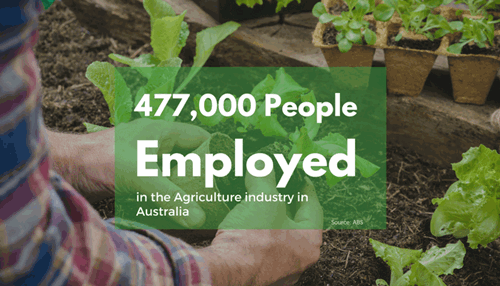These are the industries expecting growth in 2017
)
With the world economy facing the turbulent times ahead, it is not a surprise to hear that Australia’s economic growth forecasts have been downgraded to a low of 2%, putting our desirable triple A credit rating at risk. And while it will take some time for those industries that suffered from the redirection of skills and resources during the mining boom to rebuild, the good news is that this process has begun which means that there are some interesting industry growth expectations for the next few years. We look at the predictions for industries expecting growth in 2017 and beyond.
1. Agriculture and Agribusiness
Agriculture has always played a strong role in Australia’s economy and this is set to continue growing in the following areas:
Meat and Food Processing
With a growing global influence, our Asian neighbours are wealthier than ever before and are keen to try new gastronomic experiences. It is likely that Australia will play a part in providing the food requirements for this boom. According to the Australian Food and Grocery Council ‘State of the Industry’ report, despite lack of investment in domestic food, total food industry turnover continued to increase throughout 2016 with a third of Australian manufacturing now in this sector.
Cotton Growth
Australia has over 1200 cotton farms and more people are employed by this industry than either dryland cropping or grazing. Australian cotton is of high quality and is viewed as a premium product.
Organic Farming
The demand for organic food in both domestic and key Australian export markets is increasing. This has been fuelled internally by the increase in numbers of organic retailers and the presence of organic products in supermarkets. This demand is expected to have an impact, with an increase in organic certified farms predicted for 2017.
Food and agribusiness jobs span a range of qualification and skills levels. Qualifications in agriculture, business, environment and management would all be relevant to success in this sector.

2. The Aging Population
Along with that of most developed countries, Australia’s population is aging due to lower fertility rates and longer life expectancies. Between 1996 and 2016 there was an increase of over 3% in people aged over 60 years. This is set to continue as more of the ‘baby boomer’ generation reach retirement age. These statistics mean that any industry related to the aging population is likely to see a boom, including:
Health Care
Australia’s healthcare system makes a positive contribution to GDP and the general economy. This sector is already one of Australia’s largest employers and is beginning to capitalise on its success through overseas investment, particularly in China. The success of some of Australia’s telehealth and telemedicine services also offer opportunities for expansion.
Residential Aged Care
The government’s ‘Stocktake of Australian Government Subsidised Aged Care Places’ (June 2016) shows 199,449 residential care places. The size of the aged care workforce continues its steady rise. Demands for regulation have resulted in the qualification level of workers in this sector also rising with continuing shortfalls in the numbers of registered nurses.
Re-education
The re-education of our older population has not been previously considered as a growth industry but many Australians now either want or have to work beyond traditional retirement age. This older sector of the workforce will be hungry for new qualifications and retraining. As yet, this provision is relatively underdeveloped.
It is clear there are a number of ways in which the aged population is going to continue to contribute to Australia’s job growth rate. As well as the more obvious direct health care qualifications, training in community services and education would also be relevant to job booms in this sector.

3. Finance
The finance sector is a key player in the success of all growth industries. When you couple this with the growing demand from the aged population for financial advice and services, it is easy to see why this sector is one of Australia’s key areas of growth. Job security has long been seen as an advantage of working in the finance sector. However, as with any industry, requirements are quick to change and it would be worthwhile keeping an eye on growth in the following areas:
Funds Management
The growth of Australia’s fund management sector is outstripping that of many global competitors and is the leader in the Asia-Pacific region. This is due to a refined investment base, our government directed retirement scheme and investment from a number of foreign asset managers. There is a growing need for expertise in this area.
Payment Systems
Australia’s systems for payment, clearing and settlement are strong but will need to continue to evolve over time in order to meet the demands of new business, retail and customer service models. With the rise in online and other non-traditional banking systems, there will be an emphasis on customer experience and cyber security.
Retail Banking
There is a long list of factors that are currently having an influence on Australia’s retail banking. These include, our financial relationship with Asia, our aging population, constant technological changes and higher levels of consumer awareness. Retail banking has a growing need for a workforce that can help ensure small, simple and connected services that retain customer trust and loyalty.
In such a changeable area of growth, there is plenty of opportunity for those looking to retrain into the finance sector. Accounting and finance courses are a great place to start.

We live in interesting times and Australia’s economy is subject to previously untested influences. For those looking to start, further or change their careers, it pays to keep an eye on areas of industry growth and possible job booms. By planning ahead, we can all take a share in this country’s economic successes.
Wondering which courses you need to stay ahead in today’s job market? Find out here
Interested in a career in agriculture or agribusiness? Find out more in our industry profile.


)
)

